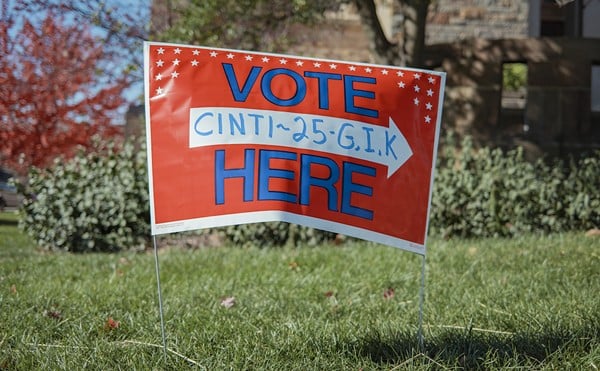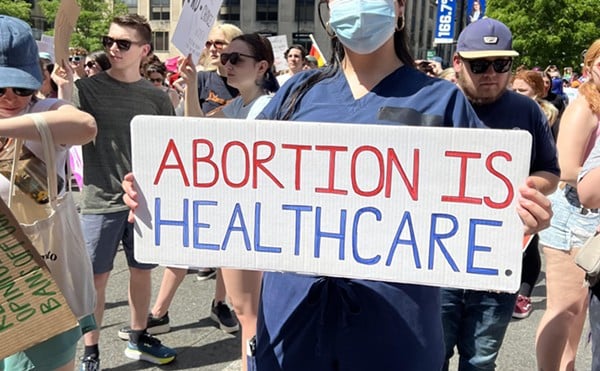For all the talk about "empowerment" and "coalition building" by community activists and politicians, it's nice to see the real thing develop instead of just hear the words. The Fair Elections Coalition's Jane Anderson is talking about the real thing.
This genuine coalition, composed of about 20-some member groups, has been working for about a year and a half to come up with some form of meaningful campaign finance reform for Cincinnati's municipal elections. A 1999 City Council candidate, Anderson speaks from experience on the topic of campaign financing and the influence of money run amok.
"I experienced this first hand in 1999," she says. "I did not accept more than $1,000 from individuals or $2,500 from a PAC. And believe it or not, I turned down money. People said to me, 'You're crazy,' but you've gotta walk the talk."
She was feeling the pressure from contributors and recognizing their considerable influence in the debate of issues. "And I tell you, when you start accepting money above those amounts, you start worrying about what they're going to think of how you vote on certain issues."
Anderson feels strongly that it's important "to keep elected people beholden to the voters and not to wealthy special interests that finance campaigns." She says that the coalition's efforts came from "a recognition that we needed to go the charter amendment route. The campaign finance reform that council adopted, they voted out."
Before 1994, she says, there were no regulations at all for City Council campaigns. Then council set mandatory spending limits for candidates and contribution limits for individuals. The spending limits were ruled unconstitutional in 1998, in line with the Supreme Court's 1974 Buckley decision that equated campaign contributions with speech. Council then voted out the contribution limits, even though such limits were expressly permitted under Buckley.
But in the interim council election in 1997, Anderson says there was a noticeable dip in campaign spending due to the contribution limits then in effect. That became the seed from which further reform efforts sprung.
"It became obvious to us that we couldn't count on council," she says. The key to successful reform, already established on the national level, would be voluntary spending limits in exchange for partial public funding of campaigns.
Having studied the reforms in place in other cities and states, the coalition worked on the best options for Cincinnati's mayoral and council elections. Their proposal features: 1) Contribution limits of $1,000 for individuals, $2,500 for PACs and $10,000 for political parties; 2) stronger public disclosure, including the names and amounts of contributors 60 days before the election, and electronic filing for easy public access; 3) a 2-1 matching of public funds to private funds raised, with a cap of up to three times the annual salary for the office sought (example: $50,000 raised gets $100,000 in matching funds); and 4) a citizens election commission appointed by the mayor and consisting of people from each political party plus two independent citizens. The commission would enforce compliance with campaign regulations, with the power to impose civil fines.
So the natural question for any intelligent citizen to ask is, "Where did all this come from? Who's behind it? And is this just another special interest posing as a community watchdog?"
The list of reps from various organizations reads like a who's who of the most reputable community organizations — the League of Women Voters, NAACP, Women's City Club, Ohio Citizen Action, Charter Committee, Alliance for Democracy, Cincinnati Women's Political Caucus, ApplePAC, AFL-CIO Labor Council, Common Cause, Homeless Coalition, Citizens for Civic Renewal, Sierra Club, Coalition of Neighborhoods and many others. It's not a front for some special interest or industry, unlike those ubiquitous commercials featuring "Flo" or the senior citizens bussed from Canada.
And the doors for membership are still open. Anderson encourages any organization to send representatives to participate in the process. Individuals are welcome, too. Right now they're trying to get more involvement and support from business groups and leaders, including the Chamber of Commerce. But she recognizes that when it comes to politics and the influence of business, "Sometimes the best you can hope for is neutrality."
But when it comes to individuals, Anderson sees little use for neutrality. A teacher of political science since 1981, she's taught exclusively at UC since 1989 and constantly urges her students to become involved in whatever interests them. Sometimes that encouragement has come back to haunt her, like when she encounters her students working for candidates or issues that appall her.
"I wish it were better," she says of the status of youth involvement in politics. "Part of it is this whole general turnoff to politics. People see it as 'It doesn't matter, so why should I bother?' It becomes self-fulfilling. You don't participate and, sure enough, it doesn't matter."
Mass, grassroots involvement still makes a difference, Anderson asserts. And, in the coming months, she'll have the opportunity to see it work. The coalition now has to prepare its petitions and take them to member organizations for endorsement. And they'll need to garner a volunteer base to take them to the public. They'll need 12,000-13,000 signatures to get the 6,900 valid ones required to go on the ballot in May 2001. They're hoping to complete that phase by January 2001.
One of the coalition's biggest obstacles stands to be the problem some citizens will have with their tax money going to politicians. Anderson illustrates the alternative: "If it's not tax money from the people, it's money from the wealthy or the special interests, and then who are they (politicians) gonna be beholden to?"
She says the current system "almost sets us up for a plutocracy, a rule by the rich. We have to do something that will help restore democracy and move us away from that." She sees campaign finance reform as "an investment in democracy and good government."
To get involved with the Fair Elections Coalition, to volunteer or to receive more information on bi-weekly meetings, call Bill Woods at 381-4994. Watch for more details in CityBeat.POWER OF ONE is the political made personal. Contact Michael at CityBeat, 23 E. Seventh St., Suite 617, Cincinnati, OH 45202, or e-mail him at [email protected].





